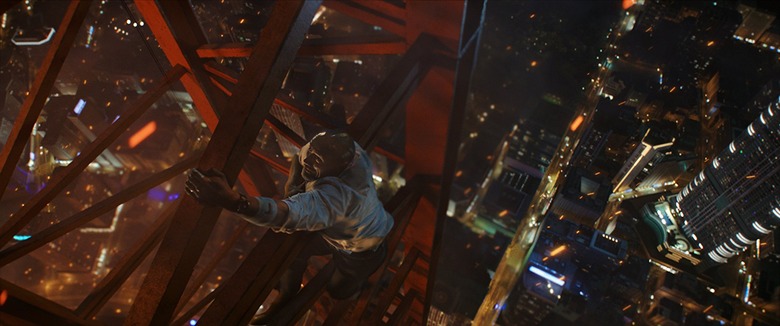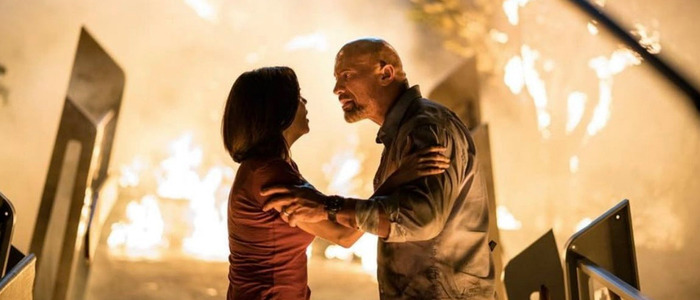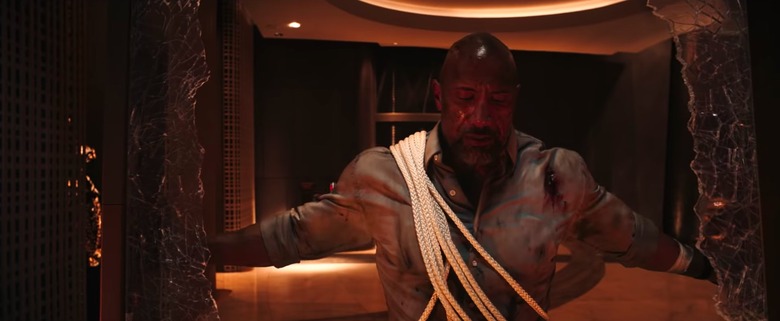'Skyscraper' Is A Surprising Mark Of Improvement For Disabled Representation On The Big Screen
I initially had little interest in watching Skyscraper, the new action adventure feature starring Dwayne "The Rock" Johnson. I hadn't watched any of the trailers and knew little more than "It's Die Hard starring the Rock." I had even more trepidation upon discovering Johnson's character, Will Sawyer, is a disabled man with a prosthetic leg. As a disabled writer, I worried how the movie would use disability. Would the Rock be a man with a magical leg that did all manner of things? Would the disability be considered a curse his character resented until it benefited him personally? But in the end, Skyscraper, a B-movie throwback, might have actually given me a portrait of disability I supported.
Skyscraper follows Will Sawyer, an American security consultant traveling with his family to Hong Kong. Will's job is to check the safety protocols of a new high-rise building called The Pearl. But when The Pearl is set on fire by a gang of mercenaries, Will must find a way to get into the building to save his wife and children.
What Skyscraper Does Right
Hollywood only brings disability into a narrative when it is the subject of said narrative. The Theory of Everything, Stronger, and Me Before You only exist because of their leading characters' disability. These films are perceived as "Oscar bait," and sold as movies meant to inspire the able-bodied audience buying a ticket with the story of this presumably courageous individual who overcame some horrific death sentence. Skyscraper upends this mentality. It's an action movie, with no allusions of doing more than having a strong opening weekend. There's no attempt to overcome any adversity because, for the script and the character, the adversity is the building itself, not Will's disability.
There's no need to triumph over disability because there's no overt reason for the character to be disabled. He just is. The audience meets Will Sawyer as he attempts to defuse a hostage situation. Things go awry and he wakes up in the hospital where, despite being told he's "gonna be okay," he loses his leg. Yet there's no discussion of suffering and/or how Will's life was changed by this injury. When he talks to his friend, Ben (Pablo Schreiber), who also suffered slight scarring in the accident, Will only has good things to say about it. If not for that situation, he'd have never have met his wife, Sarah (Neve Campbell) and become a father. His talk with Ben never brings up his leg and disability at all. He doesn't attribute his missing leg as getting him his family, just the situation in general. His disability isn't perceived as a detriment or a benefit, it's just something he's had to adapt his life around. There's no black and white, good or bad category for Will's disability. It's a personality trait, no different than his eye color.
By not making a big deal of his disability, Will is a character who represents a marked improvement in representation. People with disabilities don't want their disability to define them, and Will's doesn't define his character. It adds to it.
Adaptation and Action
The nature of adaptation is used effectively in Skyscraper. It's not to say it's flawless – as we see Johnson climb, jump, and walk his style gives away his able-bodiedness – but there is a tacit awareness by the screenwriter and Johnson himself to remember the character lives with a disability. The minutiae of his day is shown, with the audience seeing his leg as well as how he puts on the prosthesis. During a fight scene, Will's leg is ripped off his body, leaving him to fight without it. It's this moment that sticks out because it's not meant to be exploitative. Will doesn't weaken, but shifts his style. He adapts and reverts to how to get by without it. Where the fight was once between adversaries of similar height, Will fights closer to the ground, relying on momentum and a low center of gravity to gain an advantage over his opponent. And surprisingly, there's little belief that this fight works strictly because it's Johnson. His weight gives him an advantage, but his disability aids in the challenge without becoming an impediment.
Later on, during his attempt to gain access to The Pearl, the camera reminds us of his leg, angling to see it under his pant leg. At one point, we see Will take it off to fix it in order to help him scale the building. It isn't a concern he's chronically worried about, but the script and Johnson take time to factor it into how the character would need to add it into his plans. A disability requires the person living it with it to always prepare as best they can, while still attempting to do what they want. Will thinks in this way.
Skyscraper threatens to use disability as a deus ex machina towards the end, but even then says something new. As Will attempts to gain entrance into a locked penthouse, he has limited time to reach the door. Before it closes he uses his leg to keep it open, giving him what he needs to kickstart the finale. This moment could have been ridiculous, and it is, but it is another example of adaptation for a disability. The movie doesn't declare Will's disability is beneficial because of this scene. Will has to figure out a way to do something and literally utilizes his disability as the means to execute it. At the end, his life isn't made better or worse. His character doesn't walk away a changed man appreciating being disabled. He gets his family back and seemingly ends the film the same way he started. It's just a facet of his personality he deals with in order to overcome this great challenge.
But Let’s Not Declare Disabled Representation Solved
Skyscraper isn't the end-all, be-all of disabled representation, and it still gets things wrong. Dwayne Johnson isn't a performer with disabilities, so he's still taking on the role of a character with a disability and performing it. The character is also written to fall into the "able-bodied buffer" category, a term I use to describe any character shown as previously able-bodied before a traumatic event. This "buffer" is created as a means of helping the able-bodied audience bond with the newly disabled character, under the belief that disabled people are so mysterious that there's no point of entry for the audience short of reminding them the character was one "like you." In this case, Will is disabled after years of living without a disability.
But, overall, it looks like outside research might have been employed by screenwriter Rawson Marshall Thurber and/or Johnson himself into how to accurately convey how people with prosthetic legs live. Or maybe the script didn't even think to fall on disabled tropes, and I'd love to think that is the case as it truly means someone sought to represent a person with a disability just different enough to show they knew a disability requires change, but not so much that he's not relatable or perceived as falling into stereotypes. And considering how disabled cinema in Hollywood tends to glorify white men, it's refreshing in general to see a man of color like Johnson take on the role to begin with.
Skyscraper, maybe without being fully aware of it, created a portrait of disability I actually enjoyed. It's not perfect, but when I'm left feeling screenwriters and directors trot out disability to win awards and sympathy, Skyscraper sticks out by avoiding that. The character is an average man with a unique way of living life, and the script doesn't give him a pat on the head for just getting up in the morning. It presents a human being who can conquer the world with a disability and I couldn't have been more pleased.



